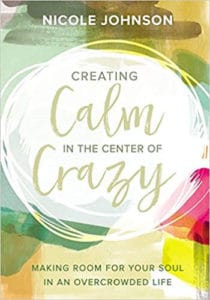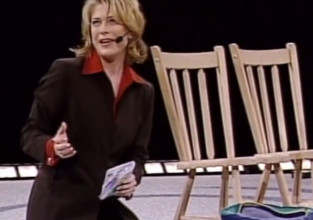Excerpt:
Nicole Johnson: Motherhood is hard. (LAUGHTER) And I wish somebody had told me that ahead of time. You know, not smiled and patted me on the back and told me that. But sat me down, looked me square in the face and said, “You might not survive this.” (LAUGHTER)
End of Excerpt
John Fuller: That’s Nicole Johnson describing part of her exciting, challenging and sometimes even crazy life. And we’re so pleased to have her here as our guest today on Focus on the Family. Your host is Focus president and author Jim Daly. And I’m John Fuller.
Jim Daly: I love that, John. “You might not survive this!” (Laughter) I’ve always had a special place in my heart for moms. My dear mom, even though I only had her nine years, she did so much to keep our family together. I mean, she will forever be my hero.
It’s a tough job. And so often we get busy, we don’t stop and think about what’s happening to mom. And today is your day because we’re going to talk specifically to you. (Laughter) But dads and husbands, don’t retreat because this will really inform you about how so many women think.
And sometimes, as we’ve heard from Emerson Eggerichs and other guests here at Focus on the Family, men and women don’t understand each other all that well. (laughter) So you stick with us and don’t turn us off because I think you’re going to learn a lot today.
We want to recognize, like I said, that hard work. And offer you wives and moms some encouragement and inspiration this day. And because we know motherhood can be so discouraging at times, maybe you’re feeling a little inadequate today. And this is going to be that cup of cold water for you.
Nicole: Um, of course.
Jim: Hang on! (laughter)
Nicole: Because she’s a woman.
Jim: That’s right.
Nicole: If she is a woman, she’s feeling inadequate.
Jim: There’s something in the DNA about that. But hang in there. Focus on the Family is here with some help.
John: Yeah, and as I said, Nicole Johnson is our guest. For more than 20 years, she’s been an actress, a TV host and a producer. And for more than a decade now, a full-time writer and dramatist for the Women of Faith conferences. And today, she’s the founder and part of the speaking team for Seasons Weekend, which is a spiritual retreat for both men and women.
She’s a wife and mom of two and has a number of books. And the one we’re really going to really center in on today is called Creating Calm in the Center Of Crazy: Making Room For Your Soul in An Overcrowded Life. We’ve got copies at focusonthefamily.com/broadcast.
Jim: Nicole, welcome to Focus.
Nicole: Thank you.
Jim: (Laughter) You’re not an extrovert, are you (laughter)?
Nicole: Oh, you know, actually, I have a lot of introverted…
Jim: Do you really?
Nicole: …Qualities, and I’ve discovered them only later in life…
Jim: Well, that’s great.
Nicole: …Because as an actress I thought I’m just extroverted all the time as a person. But I really do refuel by getting still and quiet.
Jim: Well, that’s a classic introvert thing. No, that’s amazing. (Laughter) Hey, let’s start right there. You obviously believe motherhood can be crazy making for moms. And, you know, if you’ve seen them in the store. And perhaps you listening, you are one. And I know Jean…
John: You are the woman in the store.
Nicole: Yes.
Jim: Jean is there, too.
Nicole: If you are a woman, you’re probably in the store right now, or you’re just coming from the store.
Jim: Right. And here’s the big question. Is it crazier today being a mom …
Nicole: Yes!
Jim: …Than it was years ago? And if so, why?
Nicole: Well, you didn’t carry around a computer in your pocket along with a child …
Jim: (Laughing) That’s so true!
Nicole: …On your hip and credit cards and all the things that come with these modern-day conveniences that really have made our lives much more complicated. You know, women are great at multitasking. We’re – we’re talented. You know, I always laugh. Men talk about multitasking like it’s something new at work where they have to talk on the phone and write something down. (Laughter)
John: That is a challenge for us.
Nicole: It’s a challenge!
Jim: We’re focused. We’re compartmentalized.
Nicole: And that is great. But every woman out there is sort of, you know, like, Spaghetti Junction. She is caring for the kids and balancing the checkbook and getting to the store, buying birthday presents for, you know, other kids for parties and planning her own kids’ birthday parties. And all of that is amazing. I mean, we all should stop more than one day a year and take our hats off for these qualities that women have because they hold the families together.
Jim: It is the glue.
Nicole: It is!
Jim: I mean, it really is. Men live on that peripheral so often.
Nicole: Absolutely.
Jim: They’re involved with work, and mom’s got to pull them in, “Come on, spend time with the kids.” How many times have I heard that? (Laughing)
Nicole: My husband will come home from work, and he’ll be in his socks, he’ll step on a piece and go, “Oh,” and I’m like, “I was looking for that. I know exactly where that goes. (Laughter) Give me that. That goes in that box over there.” We’re the keeper of the pieces and the glue …
Jim: Oh, yeah.
Nicole: And we just hold it all together. But at times, Jim…phew. We need a break. We need to be able to press the pause button on our lives, or we sort of translate some of that chaos and frenzy to our families and our kids.
Jim: You know, there was a season in your life, and you write about it in Creating Calm in The Center Of Crazy, where you experienced many wonderful, I think, life-changing events. You got married. You started having kids, transitioned from full-time to part-time ministry. And that’s when your life started feeling really crazy.
So, for the listener who’s connecting with you right now, um, what was shaping up in your life? What was contributing to this crazy thing?
Nicole: Well, one of the things was in this shift from, say, full-time ministry, where I was very confident in my identity and my abilities; then I’m a first-time mom at 40. And all of a sudden, at my son’s preschool, I’m not Nicole Johnson; I’m – I’m Elliot’s mom. (Laughter) And – and it’s an identity all of a sudden I feel like I am supposed to prove all over again. Because this is my son now we’re talking about. Well, he can’t have a mom that doesn’t show up for things or bring, you know, homemade goods…
Jim: But it’s not just show up. It’s, like, show up perfectly.
Nicole: Exactly.
Jim: Wow.
Nicole: And then you realize, “Oh, my gosh. I’m back in the soup again because I’ve – I’ve traded one identity that I was secure in for another one, that now I’ve got to learn to trust all over again.”
Jim: You compare motherhood to a pressure cooker (laughter). I think I get it but explain it.
Nicole: Well, pressure cookers have kind of come back (laughter) which is cool, but when I was a kid…
Jim: (Laughter) Hooray for the pressure cookers.
Nicole: I know. My grandmother’s pressure cooker was, like, this crazy thing that would sputter on the stove, and you always had to…
John: And you were afraid of it.
Nicole: I was because it would throw off…
Jim: Well, I was going to say, these are dangerous.
Nicole: …These boiling hot, hot drops of water, and you could get hit by that if you walked by.
Jim: I think the concept is like a volcano, if I remember correctly (laughter).
Nicole: Right, under wraps.
Jim: Yeah!
Nicole: So, what goes on inside of there makes everything cook really fast. But the problem is, it’s a little bit dangerous because if you leave it too long, then what’s inside just becomes mush. And I like to think of myself in some ways – and a lot of women – as pressure cookers. That we can take a lot of the pressure, but we have to know when to press the release valve or we run the risk of damaging, you know…
Jim: Yeah.
Nicole: … what we’re – what we’re trying to do.
Jim: That’s a great analogy. Um, you know, like so many people, there seems to be a demarcation point where something happens that’s catastrophic. It just changes your life forever.
Nicole: Yep. Yep.
Jim: What was that day for you that was the defining day?
Nicole: Well, I always say it takes a crisis to move us off of center because of what we’ve described. You know, we’re – every day is just full to the brim. It’s not like you wake up thinking, “What do I want to change today? How do I want to grow?”
Jim: But let me ask you – and I appreciate that. And I’m curious if you have found this to be true with the women that you’ve spoken to. There can be two responses – one who takes a crisis and can bend that into something that they can grow from. But I think there are some, too, that a crisis – and especially a crisis upon a crisis – can overwhelm a person, and they feel like they’re in such a hole, they can’t get out.
Nicole: Right, right.
Jim: Describe both of those.
Nicole: Well, I think there’s the right time – when a crisis, a real crisis, hits, it does send you into a hole. Nobody’s prepared for it, and nobody gets out the handbook and goes, “OK, on Page 4, here’s what we do when the crisis happens.”
Jim: Yeah.
Nicole: It does sort of make you collapse. The question is what you do subsequently. Whether you stay in that hole or you realize, “Hey, this is kind of an opportunity.” So, I always say, don’t waste the crisis. Because information doesn’t move us to a better life, and technology doesn’t move us to a better life. But a crisis can bring something to our attention that will bring us to a better life.
Jim: And in that general definition, Nicole – and I’m going to hear what your crisis was in a minute here. But again, for that woman that’s feeling in that not just a pothole but a pit, what is something she can do to kind of change the way she’s approaching it or thinking about it that can help her today, especially in a – in a, you know, a Jesus orientation? What is the Lord saying to that woman?
Nicole: Well, and what I will get to, what I’d like to get to, is it is in this stillness of oftentimes the hole or in the crisis that we come back to these simple truths and that we’re loved by God.
Jim: Well, let’s put a bookmark there. Tell us what your crisis was. What was this wall that you hit?
Nicole: Well, you know, the interesting thing, Jim and John – and I’m going to say this because it – it often – it has drawn some ire from some readers – is, I don’t go into a lot of explanation about the crisis, simply because every woman has her own crisis with her own name …
Jim: Sure, that’s good.
Nicole: …For me, it was an email that came of a long-standing 15-year friendship. And basically, it just said, “Mm, not interested in being friends anymore.”
Jim: And you had no reasons…
Nicole: Had no reason.
Jim: You didn’t understand why.
Nicole: Nothing had happened. I didn’t understand why. She didn’t want to talk to me anymore. Told me not to reach out to her.
Jim: Wow.
Nicole: I thought, “Oh, my goodness. Do I have a criminal record I didn’t know about it? Did she discover I was an ax murderer?” I mean, I – (laughter) you can cut that if you want to because I’m really not.
Jim: (Laughter) No, we’re keeping that!
Nicole: But it’s so crazy because I could not explain it. But for whatever reason, it pulled the rug out from under my life.
Jim: And what was that initial feeling, you know, when that rug came out? What was that emotion?
Nicole: Shock. And, like, “This can’t be happening,” which is a normal reaction initially to a crisis – the doctor’s report or the divorce papers come or whatever, you know, thing…
Jim: Grief.
Nicole: …Grief, of course. You get the call that someone has passed or, you know. And you’re in a real state of, “I can’t believe this” – sort of denial – a healthy kind of denial; your brain can’t take it in. And that’s what happened. I just sobbed and sobbed. And I called my husband. I was travelling, and I got the email. I called my husband. He thought my friend had died. I said, “No, it’s kind of worse,” (laughter) because she doesn’t want to be my friend anymore.
Jim: And you don’t know why.
Nicole: And I don’t know why.
Jim: Wow.
Nicole: And when the brain doesn’t understand something, it just keeps turning it over and over. It doesn’t really let it go. So, I was in that hole for a little bit, and I couldn’t get out.
Jim: And there was no contact. You couldn’t ask her, “Could you tell me, what did I do?”
Nicole: “Tell me why. What did I do? What can I do to make this right? Or how can I restore our relationship?” Uh…
Jim: Didn’t happen.
Nicole: Didn’t happen. I had a couple of mutual friends that I asked to reach out to her on my behalf to see if she would be willing, and she was not willing.
Jim: Wow.
Nicole: And, um, it’s still something to this day I can’t explain. But what I say is the details of my story don’t matter as much as the day, for all of us as women, that life falls apart. That’s the day – we kind of remember it as the day that that particular thing happened.
Jim: Well, and that’s what I appreciate about what you share in the book because these thoughts and ideas and prescriptions that you provide can be applied to any situation…
Nicole: Any situation.
Jim: …Where you’re in a hole emotionally.
Nicole: Exactly.
Jim: Describe those two gifts that you talk about where you received from the Lord, you know, kind of a path forward for yourself. And how to reconcile that painful loss of your friendship without being able to talk about it.
Nicole: Right. Well, I call them dark gifts because…
Jim: Dark gifts.
Nicole: Yes. They’re not a gift you would really wish on anybody, but that’s why I say to women, “Don’t waste it.” If you’re in a crisis, don’t just give up. Figure out what it’s telling you and where you need to go. And for me, the pain was the pain of rejection. And I had felt that pain before. So, I sort of became a detective into my own pain with God’s help. Sort of metaphorically taking God’s hand and saying, “You don’t – you know, you don’t have to be afraid of the dark, Nicole. Let’s go and look and see what that’s about.”
Jim: Where did that pain come from? What is that…?
Nicole: It was early, Jim. It was early. My parents divorced when I was young, and my mom was a single mom for a number of years with three kids, and she was under 25. And…
Jim: Hm.
Nicole: …And I have incredible empathy for her now. But what I – what came to me with, you know, just help and processing in that still place was, I could see myself sitting outside my mom’s bedroom door crying, saying, “What did I do, Mom?” Because my mom would get mad, and she would go in her room and shut the door and lock it and not come out. And I saw that little 5-year-old girl who couldn’t get her mom to come out, and I didn’t know what I had done…
Jim: Oh, my goodness.
Nicole: …And all of a sudden, that is what I felt when my friend rejected me.
Jim: That was the connection point.
Nicole: That was the connection point to say, “This rejection feels so bad because I’ve felt this before.” They say when it’s hysterical, it’s historical. So, look into your crisis is the first thing. Don’t be afraid. Take God’s hand, and go right to where the pain is, and try to name it, and put some words around it.
And for me, then that sense of rejection gave me a place to go. To work on, to think about, like, how could I still – that’s every woman’s, like – you know, between 9 and 9:30, how am I supposed to work on this, you know?
Jim: Right.
Nicole: How am I supposed to feel this? Not gloss over it, but yet, at the same time, I can’t just stay in bed and cry all day. And so, part of it is creating that safe space, asking for help.
And we are the worst at asking for help. You know, women – the No. 1 killer of women is heart attacks. And it’s not because we have more heart attacks than men. It’s because ours are fatal. And you know why ours are fatal? Because we ignore all of our symptoms.
Jim: Wow.
Nicole: We don’t pay attention to them. So, by the time we have the heart attack, we can’t – we’re – you know, I laugh. I always say, you know, “I can’t feel my arm, but I still have to make sandwiches today, you know?” (Laughter).
Jim: Right, I know. That is so much a mom.
Nicole: I have to keep going. Yeah, because we think because we’re holding our world together, and we do it so well, there’s this myth that we cannot stop. And when the crisis happens, the gift it’s giving you is to show you, you can stop, and you must stop.
John: Well, we’ll hear more from Nicole and that second gift that she was describing in just a moment. This is Focus on the Family with Jim Daly.
And online, we’re going to have copies of her book, Creating Calm In The Center Of Crazy. And we’ll also have our contact information so you can reach out and get some help from one of our counselors if you just don’t know who to turn to. They’re great. And the starting point is focusonthefamily.com/broadcast, or call 800, the letter A, and the word FAMILY.
Jim: Nicole, as you talk about that second dark opportunity, maybe Romans 8:28 is a good bookmark here for believers in Christ, where it says, you know, all things work for good to those who love the Lord and are called by his name. But when you’re in that hole, it does not feel like that.
Nicole: Yeah, well…
Jim: And you’re saying, “Lord, seriously? This is going to work for something good?” And you don’t believe it.
Nicole: Right.
Jim: But, man, it often, if not always, works out in some way.
Nicole: Yeah.
Jim: What was No. 2?
Nicole: Well, No. 1 was to realize that, often, a crisis is a gift. And No. 2 is that even though, again, it’s a dark gift – that the world does not fall apart if you stop.
Jim: That’s a great insight. Why do you think so many moms feel the weight of the world?
Nicole: Because they carry the weight of the world. And the hard thing is, you know, we know – as I said, we know where all the pieces of the games are. We know when the socks are lost. We know where everything is. And it’s very hard for us often to just let go and trust that even though our husbands have no idea where the socks are, that it’s gonna be OK. That if they make dinner and it’s less than perfect and they have to order pizza, that’s OK, too. And so…
Jim: Now you’re cutting a little too close to home. (LAUGHTER) No more analogies here, OK?
Nicole: Then the world, our world specifically, is going to still. Our inner world is as important to us as women as our outer world.
Jim: Yeah.
Nicole: And that is what a crisis can teach you. And one of the Scriptures I like to say is, “Be still and know that I am God.”
Jim: Yeah.
Nicole: And then I add or stay busy and keep wondering.
Jim: Wow.
John: Oh.
Nicole: Or stay busy and keep thinking you are God. And so, part of that dark gift in the crisis is that when you have to stop, you realize, “Oh, my gosh. I have been trying to control things that are out of my control. I’ve been trying to control stuff that makes me feel better as opposed to my family.” You have a chance to assess where you are.
Jim: Huh. Nicole, I was really fascinated by one of the stories with that last hurricane a while back, Dorian. And it sat over the Bahamas there.
Nicole: Right. Ugh.
Jim: And the story that this reporter captured was how a person was near the eye, and they were able to walk kind of into the 150-, 60-, 80-mile-an-hour wind and then walk, like, across the street. And it was calm because it was in the eye, and it just kind of vacillated there. What a picture for what you’re talking about. If life is that 180-mile-an-hour wind, and the calm spot…
Nicole: Right.
Jim: … is finding that place where you can hear the Lord and know that all this chaos is going on around you. Describe that element that you talk about in the book where you find your calm place, the eye of the hurricane.
Nicole: Right. And that’s really right, Jim. In so many ways we can’t control those 180-mile-an-hour winds. The circumstances of our lives are swirling around us on a daily basis. It’s not like, you know, every time we can say no to the mother-in-law and father-in-law, “You can’t come for 3 1/2 weeks,” you know? Sometimes you just have to deal with the circumstances. The kids’ play falls on the same day as, you know, the scouting, you know, expedition. And so, there are circumstances all the time that just create this sheer breakneck pace that are 180-mile-an-hour winds. But…
Jim: So that value of stillness, what do you prescribe to people?
Nicole: What I propose is that this crisis – which I think it almost always takes one, because it’s not something we can just conjure up in our head – is when we can’t move forward, when we are still, to invite God to meet with us in that space in our lives and in our hearts and create that stillness. That right here in this spot, without my contributing, without my trying to stop the 180-mile-an-hour winds, just laying right here sad and broken, you meet me. And I’m enough, and you love me.
Jim: What was that for you? What – was it a room, a chair, a sofa?
Nicole: Well, what happened for me, which is really – I love to help other women create this – is to create a still place inside of yourself. A place that you can picture. Maybe it’s a favorite chair or a place you’ve been on vacation, like, a bench where you sat outside and looked …
Jim: That’s a good thought.
Nicole: …At the water. And then you create that place. And you can go there in your mind when the hurricane winds start swirling. And you invite God to meet you and sit with you on that bench, or to sit next to you in your chair.
Jim: Yeah.
Nicole: And that is your calm.
And too many people think that calm comes from controlling the crazy. And you can’t. You can only create calm inside of the crazy because we are only in control of us. Much of the craziness comes from trying to create and counter the crazy rather than the effort to create the calm.
Jim: Yeah.
John: I appreciate the proactive positioning that you’re having here, Nicole. My wife has had a series of – it seems every summer, she gets sick. Every – every summer, she has some physical malady, and she’s got to stop.
Nicole: Yep.
John: And even this morning – she had a couple of sleepless nights this past week. And she was just sitting in her favorite chair…
Nicole: Chair. Right.
John: … with her Bible. And as I left, I thought, “She’s gonna take a nap before the morning is over because God has kind of pushed her to do that.” And she’s had to choose to say, “It’s not failure.”
Nicole: Nope. That’s right.
John: So how does a woman get through that sense of, “I’m failing if I go to the calm”?
Nicole: You know, there’s a wonderful story, um, that I heard years ago, and I’ve held onto it. And it was, um, sort of a young disciple asking his mentor how to get over the guilt that when he gets still, he falls asleep, you know, on God. And that’s a big burden, and he feels guilty about that. And the mentor said so wisely, “You need to adjust your picture of God.” So, if you picture God sitting by the fire of the universe, rocking in a chair, and you’re the dog that’s asleep at his feet, should you feel guilty as the dog falling asleep? Or should you just take that comfort to go, “I’m here, and we’re together, and the world is a safe place in this moment and in this spot”? And I think too many of us – Christian women in particular – our identities are wrapped up in what we do and how we perform, instead of whose we are and who we know and why our worth and value is secure.
Jim: Nicole, that is powerful, what you’re saying there. And I hope women, moms, are listening and can really attach to that. And you’ve done such a great job in the book describing where you were at and where God has brought you from.
Nicole: Hm.
Jim: Right at the end here, Nicole, I want to be able to provide that practical application to creating calm for your family. Especially the moms that are feeling in that hole like we talked about. In your book, you mention setting boundaries, take a sabbatical, stop working, if that’s…
Nicole: Take a sabbatical from social media is what I say specifically because, you know…
Jim: That right there is a good thing to do.
Nicole: It’s a joy robber, exactly. I mean, very few women can take a full-fledged sabbatical, but you can take a week or two without checking in on Facebook. You may get hives for a little bit, but then you’ll get over it.
Jim: That’s a form of silence, really, when we disconnect. And that’s good.
Nicole: Exactly, intentional.
Jim: The other one I liked was, “No is a family word.” I think that’s great. Explain it.
Nicole: Well, too often with kids, we become the ones, you know, saying no or trying to protect the boundary. But our kids want time with us, and we want family time, so we have to create that as a family. That may mean that they have to say no to some things that they want to do. And we model how to say no for some things that we want to do so that we can be home and be together and sort of protect our time. And when you involve them in that, it makes a big difference.
Jim: That’s a good thing, teaching your child to learn no.
Nicole: Right.
Jim: That right there is a great parenting tool.
Nicole: Right.
Jim: And then you have to model it.
Nicole: Yes, I will say to the kids, “There’s something at school tonight, but I’m not going to go to that” – not that they’re going to or involved in, but that’s just for parents – “I’m not going to go because I went to two things last week and we’re gonna be home tonight. And Wednesday night is, you know, a special night for us.” So, they see me doing that, and then when it comes time to pick sports, it’s like, “Buddy, you’re gonna have to pick one because we can’t go from back to back, to sport to sport. That won’t give us any time as a family.
Jim: Yeah. That is so good. Nicole, as believers in Jesus Christ, I think a good place to land today would be for you to pray.
Nicole: Mm.
Jim: Pray for those moms that you have talked to over the years, that you’ve counseled with, that are listening right now. The same kind of issues…
Nicole: I would love to.
Jim: …That they’re facing – uh, lift them up now.
Nicole: For those that can hear the sound of my voice, whether you’re driving or doing the dishes or even somewhere at work taking a little break, take a deep breath, and remind yourself that you are loved by the God of the universe. That you have never spent one day of your life not loved by God. And give yourself permission to be right where you are. Give yourself permission to feel, knowing that the world is not going to fall apart. Even though we know it rests squarely on your shoulders right now, be still and know that God is God. Let go of things that you cannot control, and trust that God has got this on your behalf. Be the best mom you can be by being the best child of God that you know how to be. In Jesus’ name, give us strength. Amen.
Jim: Yeah. That is great. Nicole Johnson. Wonderful book – Creating Calm in the Center Of Crazy. Thanks for being with us.
Nicole: Thank you so much.
John: And we’ll encourage you to go by our website or call us to order your copy of Nicole’s book.
We can also connect you with one of our caring Christian counselors, if that’s a need. Stop by focusonthefamily.com/broadcast or call 800, the letter A, and the word FAMILY. 800-232-6459
Jim: John, I think Nicole’s book is so valuable that I want to make it available to every family that contacts us. If you can send a gift of any amount we’ll put it in your hands. And even if you can’t afford it, contact us anyway. We have generous friends who I am trusting will help cover the cost of this resource so that you can get a copy. So, don’t let that be a deterrent. If you need the book get a hold of us today.
John: Donate and get your copy of Creating Calm in the Center of Crazy at focusonthefamily.com/broadcast. Or call 800, the letter A, and the word FAMILY.
We hope you have a great weekend with your family, and your church family. And then join us again on Monday. We have a very insightful message for single adults about finding the right person to marry.
Teaser:
Gary Thomas: I mean, if you want to marry Eeyore, you can marry Eeyore. But sometimes it might be fun to go off with Tigger for a little bit, so look for joy.



















